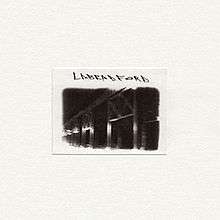Labradford (album)
Labradford is the third studio album by American post-rock band Labradford. It was released on November 12, 1996 by Blast First and Kranky.[8]
| Labradford | ||||
|---|---|---|---|---|
 | ||||
| Studio album by | ||||
| Released | November 12, 1996 | |||
| Studio | Sound of Music Recording Studios (Richmond, Virginia) | |||
| Genre | ||||
| Length | 39:44 | |||
| Label | ||||
| Labradford chronology | ||||
| ||||
| Review scores | |
|---|---|
| Source | Rating |
| AllMusic | |
| Alternative Press | 4/5[2] |
| Chicago Tribune | |
| Entertainment Weekly | B+[4] |
| The Guardian | |
| Q | |
| Select | 4/5[7] |
Track listing
All tracks are written by Carter Brown, Robert Donne and Mark Nelson.
| No. | Title | Length |
|---|---|---|
| 1. | "Phantom Channel Crossing" | 4:43 |
| 2. | "Mid-Range" | 6:29 |
| 3. | "Pico" | 5:46 |
| 4. | "The Cipher" | 3:11 |
| 5. | "Lake Speed" | 6:46 |
| 6. | "Scenic Recovery" | 4:51 |
| 7. | "Battered" | 7:58 |
Personnel
Adapted from the Labradford liner notes.[9]
|
|
Release history
| Region | Date | Label | Format | Catalog |
|---|---|---|---|---|
| United States | 1996 | Kranky | CD, LP | krank 013 |
| United Kingdom | Blast First | BFFP 136 |
References
- Cooper, Sean. "Labradford – Labradford". AllMusic. Retrieved March 3, 2016.
- "Labradford: Labradford". Alternative Press. No. 102. January 1997. pp. 73–74.
- Klein, Joshua (February 7, 1997). "Labradford: Labradford (Kranky)". Chicago Tribune. Retrieved April 7, 2020.
- Smith, Ethan (November 22, 1996). "Labradford". Entertainment Weekly. p. 139. Retrieved April 7, 2020.
- Sullivan, Caroline (December 6, 1996). "Labradford: Labradford (Blast First)". The Guardian.
- "Labradford: Labradford". Q. No. 125. February 1997. p. 98.
- Barnes, Mike (January 1997). "Labradford: Labradford". Select. No. 79.
- Sprague, Deborah. "Labradford". Trouser Press. Retrieved March 3, 2016.
- Labradford (booklet). Labradford. Chicago, Illinois: Kranky. 1996.CS1 maint: others (link)
External links
- Labradford at Discogs (list of releases)
gollark: That's storing it lossily, thus bad.
gollark: No, digital is better, as you can copy (and store!) a digital signal entirely precisely, compress it nicely, encrypt it, error-correction-code it, send it to people using computers™️, and process it on computers™️ too.
gollark: > Guys, what's the sampling rate of vacuum tubes?They aren't digital devices. They don't have one.
gollark: They, er, convert electrical signals to sound, as far as I can tell, so they're okay.
gollark: Mine are generic cheap Amazon ones.
This article is issued from Wikipedia. The text is licensed under Creative Commons - Attribution - Sharealike. Additional terms may apply for the media files.